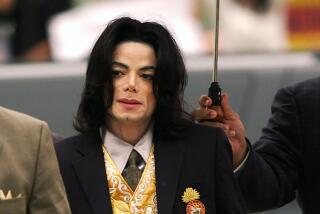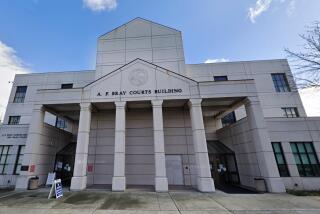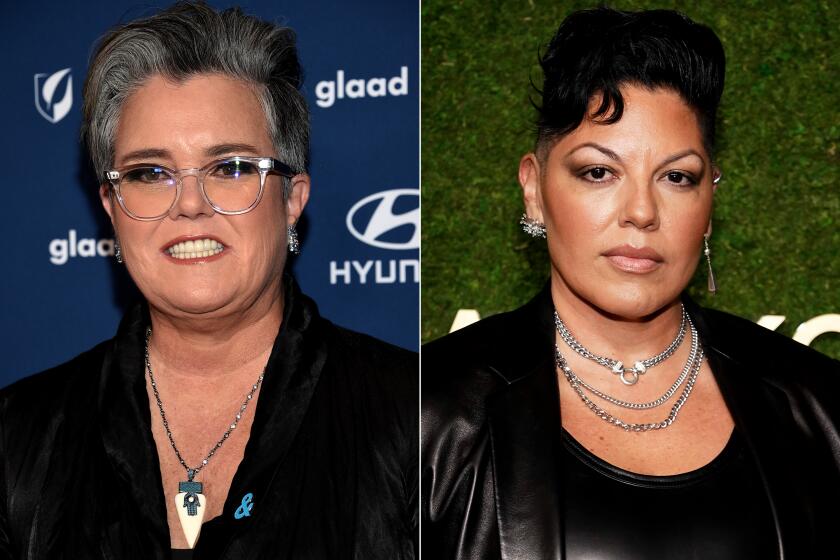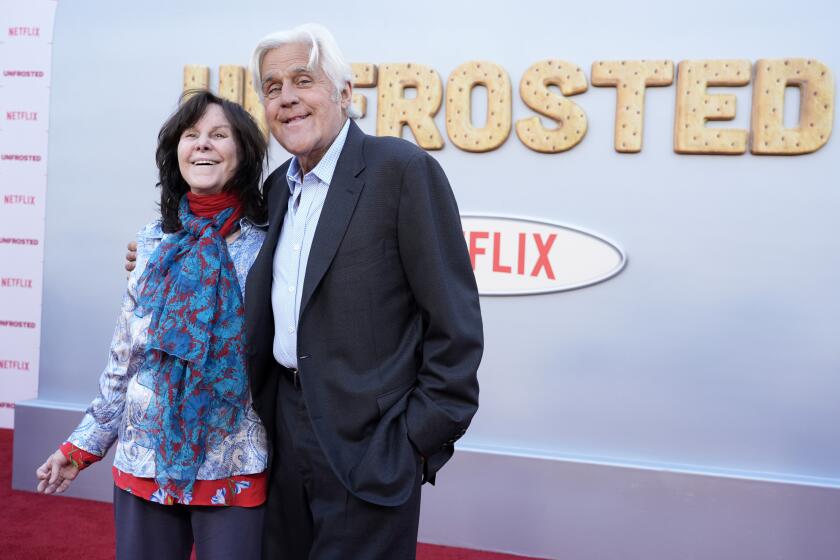Contrasting portraits of Conrad Murray emerge in Jackson case
The portrait of Michael Jackson’s doctor that emerged from the first week of his manslaughter trial in the King of Pop’s death had many faces.
Was Conrad Murray the doctor who called patients “friends” and returned their calls no matter the hour? Or was he the doctor who talked on the phone while one of them died? Was he the one who cared for the poor when they couldn’t pay? Or the one who demanded $5 million for his services? Was he the man who saved lives or the one who took the most prominent life entrusted to him?
A series of prosecution witnesses this week portrayed him as reckless and deceptive, waging a coverup before his famous client was even pronounced dead. The defense presented Murray as a dedicated physician who had gotten in over his head trying to help Jackson, a man he cared about, prepare for a comeback.
This contrast was on display Friday, when the prosecution called one of Murray’s former patients to the stand.
The patient, Las Vegas salesman Robert Russell, testified that he felt desperate, frustrated and abandoned when Murray failed to keep crucial appointments about his heart at about the time of the pop star’s death. Russell said he felt he was “at the end of the rope” after the physician canceled two meetings concerning treatments for his heart.
“I was dismayed, flabbergasted; I felt left out, I felt abandoned,” Russell testified Friday.
But he also credited the doctor with saving his life after a heart attack, and said that the doctor took the time to follow up with detailed personal phone calls about his health. When he tried to leave the hospital early after a heart procedure, Murray sternly cautioned him about what kind of medical danger he was in.
“I felt like I was getting the best care in the world,” Russell said.
The exchanges offered a glimpse into an important element of the defense strategy: Focusing on what attorneys describe as Murray’s charitable work and testimonials from people who say Murray saved their lives. During opening statements, Chernoff told jurors that they would hear from an 82-year-old woman who was treated at a clinic Murray set up in one of the poorest neighborhoods of Houston.
As the prosecution this week presented witness after witness who harshly criticized Murray’s conduct before and after Jackson’s death, the defense persistently asked them if Murray appeared on the surface to care about Jackson and have his best interests at heart. Several answered yes.
Still, the overwhelming bulk of testimony portrayed Murray as incompetent and far more concerned about his own paycheck than the well-being of his famous charge. He balked when a choreographer raised concerns about Jackson’s health and repeatedly said his patient was in excellent condition while he was injecting Jackson nightly with propofol to get him to sleep.
After Jackson stopped breathing, witnesses said, Murray performed inadequate CPR and delayed calling 911 while he grabbed vials of drugs and stuffed them into a bag.
There was more damning testimony Friday. Paramedics who responded to Jackson’s home described a frantic Murray who told them things that didn’t add up, lied that his patient was simply dehydrated and hid the fact that he administered the powerful surgical anesthetic that saturated the singer’s blood.
Although Jackson appeared dead, his skin cold, eyes dry and his pupils dilated, Murray insisted he had “just” lost consciousness, paramedic Richard Senneff testified. Murray said Jackson had no underlying medical condition, Senneff said, but the presence of a doctor in the house, the IV pole, and the IV connected to Jackson did not match up with what the physician was telling him. A second paramedic said he saw the doctor pick up three drug vials off the floor near Jackson’s body and put them in a black bag.
“He never mentioned the word ‘propofol,’ ” Senneff testified. A coroner ruled that Jackson’s June 25, 2009, death was caused by that drug.
Murray, prosecutors also suggested, was a doctor who jeopardized a patient’s life for a few hundred dollars’ difference.
They called to the stand Friday a representative of a medical equipment company who testified that the monitoring device Murray used with Jackson was inadequate for constantly monitoring a patient, and that an appropriate device could have been leased for $40 a month.
The week did have its share of moments that portrayed Murray in a more positive light.
The concert promoter, testifying about the $5 million Murray sought to care for Jackson, agreed with a defense attorney’s description that the relationship between Murray and Jackson was “caring and friendly.” An attorney who said the doctor was preoccupied with his contract also said Murray wanted a crash cart and a backup doctor for the aging star, worried about the strenuous performance he would be putting on.
Jackson’s personal chef, who said the frantic doctor never asked her to call 911 after he found the singer wasn’t breathing, described how the doctor took Jackson’s favorite organic juices up to the singer’s bedroom each morning.
“Michael Jackson and he became friends first,” Chernoff said.
More to Read
The biggest entertainment stories
Get our big stories about Hollywood, film, television, music, arts, culture and more right in your inbox as soon as they publish.
You may occasionally receive promotional content from the Los Angeles Times.








